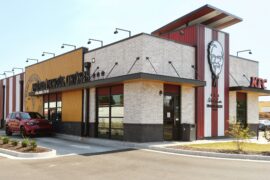Darling Ingredients on June 1 announced it has signed a letter of intent with Butterball LLC for the potential construction of a poultry rendering facility adjacent to Butterball’s Olive, North Carolina, facility, which produces a number of products including frozen whole turkey, ready-to-cook frozen boneless turkey roasts, and ready-to-eat frozen breasts.
The plant under consideration would have capacity to process about 18 million pounds of material weekly through three lines. Pending permits and the execution of definitive agreements, construction would likely begin in early 2024 and be completed in 2025.
![]()
“Darling Ingredients is committed to supporting its customers and agricultural growth in North Carolina,” said Randall C. Stuewe, the Irving, Texas-headquartered company’s chairman and chief executive officer. “A new Mt. Olive rendering facility strengthens rendering reliability, increases capacity and provides a critical service that transforms this material into invaluable ingredients and feedstock for renewable diesel and sustainable aviation fuel.”
“Butterball has been a proud, long-time member of the Mt. Olive community, providing positive economic impacts, including jobs, for many in the area,” said Jay Jandrain, the company’s president and chief executive officer. “We’re excited to explore the potential environmental and safety benefits of an improved operating footprint at Mt. Olive.”
“The announcement is great news for North Carolina’s agriculture industry,” said Agriculture Commissioner Steve Troxler. “As we continue to grow, so does the need for facilities like this one. Increasing our rendering capacity in the state provides us the ability to turn an otherwise unusable animal material into a useable product. This is an essential service for our agriculture community and greatly needed capacity to help meet demand.”
Darling Ingredients is the largest publicly traded company turning edible by-products and food waste into sustainable products and a leading producer of renewable energy. It operates more than 260 facilities in over 15 countries and repurposes approximately 15% of the world’s meat industry waste streams into value-added products such as green energy, renewable diesel, collagen, fertilizer, animal proteins and meals, and pet food ingredients.





